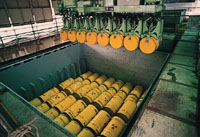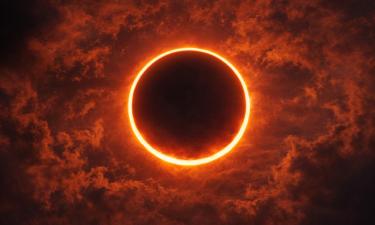Ukraine dumps nuclear wastes and chemical poisons at Russia's borders
Ukraine's activities with poisonous and radioactive activities may result in another Cheronbyl
When the notorious orange revolution finally ended in Ukraine and Viktor Yushchenko took the office of the Ukrainian President, the official Kiev gave a secret promise to several Western states. Ukrainian politicians said that the state was ready to accept spent nuclear fuel and chemical wastes from the West. Strangely enough, Yushchenko did not have enough money to build up-to-date burial facilities for it. 
Ukraine had to abide by its obligation, though, taking into consideration the fact that it was receiving adequate financial assistance from the West. The solution was found quickly: the Ukrainian administration decided to dump the radioactive and toxic garbage very close to Russia's borders. There are a lot of desolate mines in the Donetsk and Lugansk regions of Ukraine, so it was decided to use the mines as storage facilities.
Nuclear and chemical wastes were buried in several mines and quarries very close to settlements. It is worthy of note that the abandoned coal mines are not equipped to house such dangerous cargoes. Therefore, Ukraine may experience another Chernobyl in the event a state of emergency occurs there. Russia's territory is situated very close to the mines. Nuclear dust may cover six Russian regions. To crown it all, such a perspective does not seem to be exciting for Europeans either, who still shudder at the sound of the word “Chernobyl.”
The Taiwanese newspaper Independent Morning Post has recently published a sensational material. Ukraine, the newspaper wrote, sold over 500 tons of warfare agent, sarine, to China several years ago. This poisonous gas had been stored in Ukraine for years, during the existence of the Soviet Union. Ukraine decided to get rid of the dangerous substance before international inspectors could find it: sarine was sold to China. It goes without saying that Kiev has been rejecting any accusations of illegal sales, nor has it acknowledged the fact of storing other internationally banned poisonous substances.
Ukraine's then-commander of radioactive and chemical defense, Viktor Litvak, told reporters several years ago that there were practically no warfare agents in Ukraine. The official acknowledged the presence of a meager quantity of mustard gas and a kilo of phosgene. Viktor Yushchenko is certain, though, that the real state of affairs is different: the now-resigned Secretary of the Ukrainian Security Council, Peter Poroshenko, informed Yushchenko of the opposite quite a while ago. However, the Ukrainian government does not seem to be willing to inform neighbors of its commercial "chemical" activities.
Ukrainian media outlets report about numerous occurrences of poisoning among the population living in various parts of the country. Children living in the settlement of Khomutets, the Poltava region of Ukraine, have been suffering from a whole bouquet of diseases for almost seven years: the loss of eyesight and memory, pancreatitis, etc. The territory of the settlement has been contaminated as a result of leakage of an unknown poisonous substance.
There are over 50 military chemical objects in Ukraine. However, there is absolutely no information about them whatsoever. Specialists of ecology have never succeeded to obtain comprehensive data about the state of affairs on those warehouses and test grounds.
Agents of the Ukrainian security service have recently detained three officers, who tried to sell 80 kilos of strong poison, chloropicrin, which they had stolen from a warehouse. This fact proves that Ukraine does not hurry to bid farewell to its Soviet past.
You can discuss this article on Pravda.Ru Forum
Subscribe to Pravda.Ru Telegram channel, Facebook, RSS!





